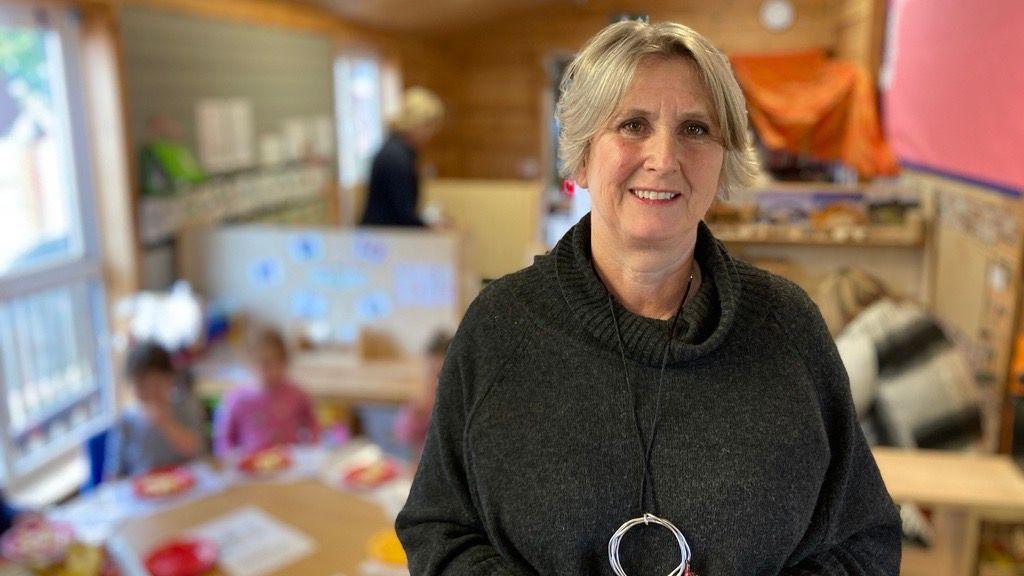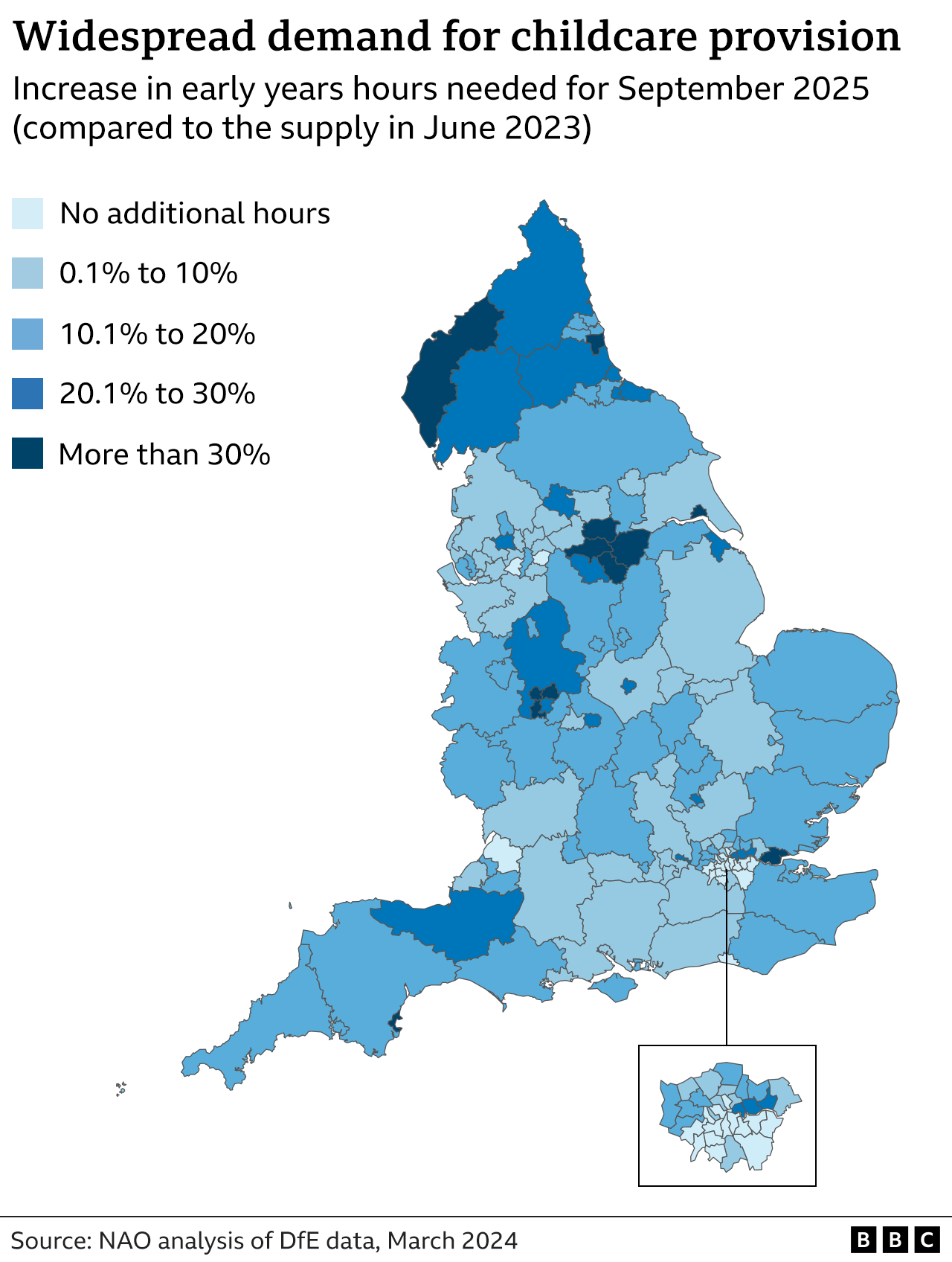Government scrapped tests on free childcare plan

As many as 40,000 more childcare staff will be needed by September 2025, according to official estimates
- Published
The government has accepted going ahead with its expansion of funded childcare for working parents, without running tests first, could be a "significant risk", the public spending watchdog says.
The National Audit Office (NAO) said the decision to cancel a £35m pilot in a small number of areas had created uncertainty about whether nurseries and childminders would be able to roll it out nationally.
The expansion of free childcare in England began earlier this month and will cost an estimated £15.2bn over the next three years.
The Department for Education (DfE) said it had taken “decisive steps” to prepare the sector.
The report, external said the DfE saw testing as “critical” to the success of rolling out 30 hours to three and four-year-olds in 2017 but decided not to test the market this time due to the cost.
Gareth Davies, the head of the NAO, said cancelling early testing plans “exacerbated the significant uncertainty about the sector’s capacity and financial sustainability”.
The NAO recommended the DfE continuously review the expansion in case it needs to relook at the timeline due to concerns about place numbers and staffing.
By September 2025, all eligible pre-school children of working parents will be able to access 30 hours of free childcare during term time.
As many as 85,000 more childcare places and 40,000 more staff will be needed by September 2025, according to official estimates.
The changes are being phased in to give the sector time to prepare.
The NAO said the dates for the scheme were decided without the DfE or the Treasury understanding whether nurseries and childminders would be able to deliver the number of places needed.
It said the DfE accepted that rolling out the new free hours “untested” was “a significant risk” and that the likelihood of delivering the number of places needed was amber-red which means “problematic”.

Alison Vickers says there is a waiting list at Wizz Kids Pre-School until September 2025 which includes 10 babies who have not yet been born
Alison Vickers, who has been a nursery manager in Sheffield for 30 years, said she had never had a problem recruiting staff until the past few years.
“It's impossible,” she said.
“We virtually have an advert out constantly - and it's not just about recruitment, it is about retaining.
“I'm losing staff to different sectors, to higher-paid roles, and I'm just finding it really difficult."
The government said almost 200,000 two-year-olds are already benefiting from government-funded places which rolled out in April.
But the NAO said the next two phases would be “riskier” as many of the two-year-olds who became eligible for free hours this month already had a nursery place.

As demand rises, many council areas across England will require a big increase in the number of childcare hours available
In Wakefield, where a 30% increase in childcare hours will be needed by September 2025, social worker Sophie Rayner said she was struggling to find a provider with enough hours available for her return to work.
“It’s a nightmare,” she said, after trying more than 10 nurseries and childminders.
“I can only find spaces on a Monday and Friday so they will be the only days I will be able to work."
The NAO said it was not clear how many parents would either go back into work or increase their hours because of the free hours - which leaves questions about whether the extension will achieve its primary aim or represent value for money.

Social worker Sophie Rayner says she was shocked when she started to look for a place as most local nurseries were fully booked
The report also highlighted concerns that:
the attainment gap could increase between children from more affluent families and their more disadvantaged peers
rapid growth in nursery places may displace those children who may be more challenging or costly to support
quality could be jeopardised with large numbers of new or less qualified staff entering the workforce.
It says the DfE should monitor the impact of funded hours on the availability and quality of places for disadvantaged children or those with special educational needs and disabilities (Send).
Meg Hillier MP, chair of the Public Accounts Committee, said that by cancelling early testing plans, the DfE “missed opportunities to learn... which would have helped it better understand, and mitigate against, the challenges local authorities would face when expanding entitlements”.
Shadow education secretary Bridget Phillipson said Labour had already promised a review to "inform our plans for a modern early-years system that better supports families with access to available, affordable childcare".
“Only Labour can deliver the reformed early-years system that will transform children’s life chances and give parents choices in the workplace," she added.
A DfE spokesperson said the government was "delivering the largest ever expansion of childcare in England’s history”.
The spokesperson added: “We have taken decisive steps to prepare the sector for the next phases, including increasing funding well above market rates, launching a workforce campaign and new apprenticeship routes, as well as providing £100m of capital funding to help expand or refurbish facilities.
"The childcare expansion builds on previous successful rollouts, including 30 hours for three and four-year-olds in 2017. Learnings from this were applied this time round".
More stories on the childcare expansion:
DfE says 85,000 more free childcare places needed
- Published19 April 2024
Childcare shortage worsens as costs rise – report
- Published19 March 2024
Cash offer for new childcare workers amid shortage
- Published2 February 2024
Get in touch
Do you work in a nursery? Are you a parent struggling to access childcare? Share your experiences.